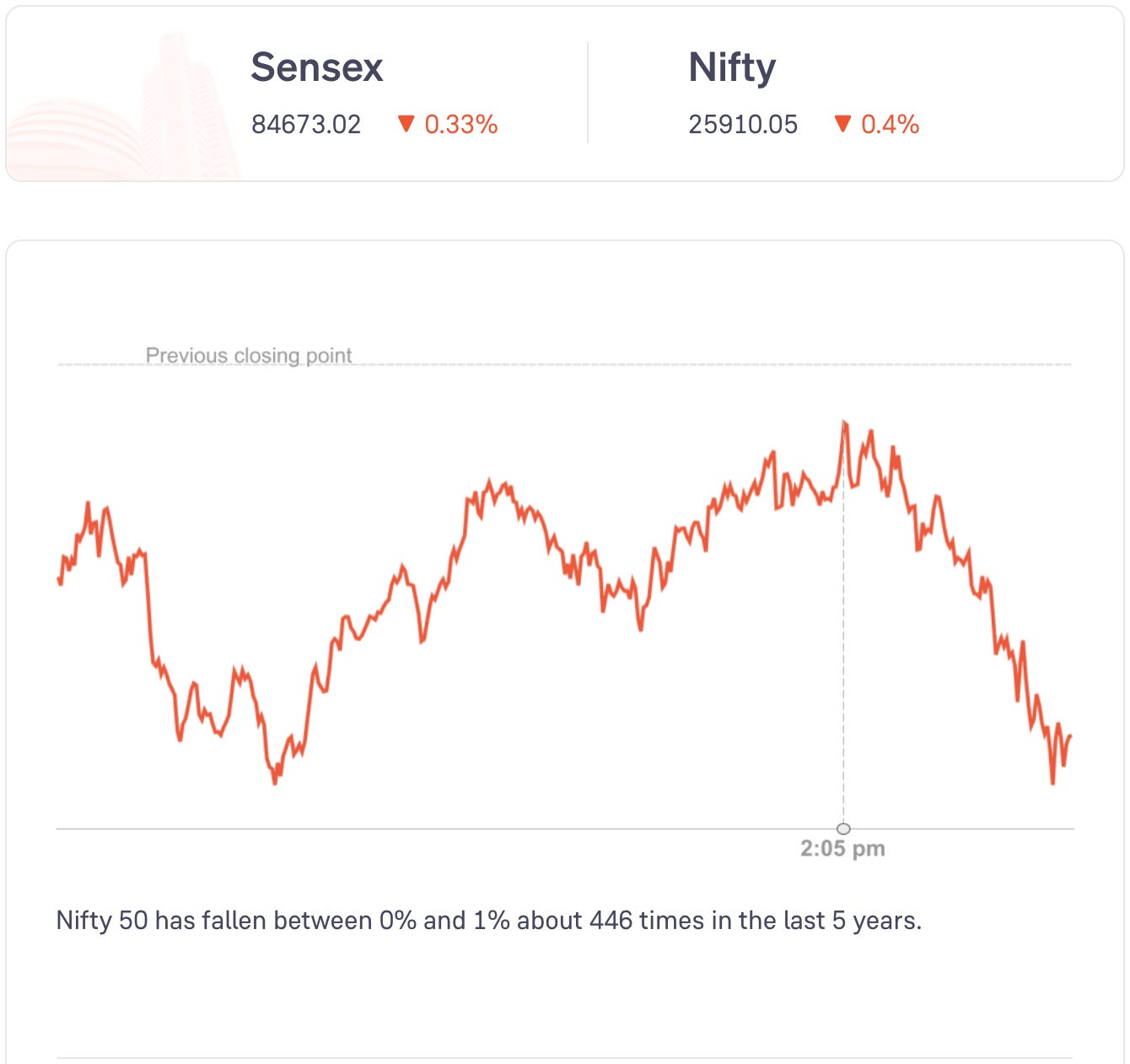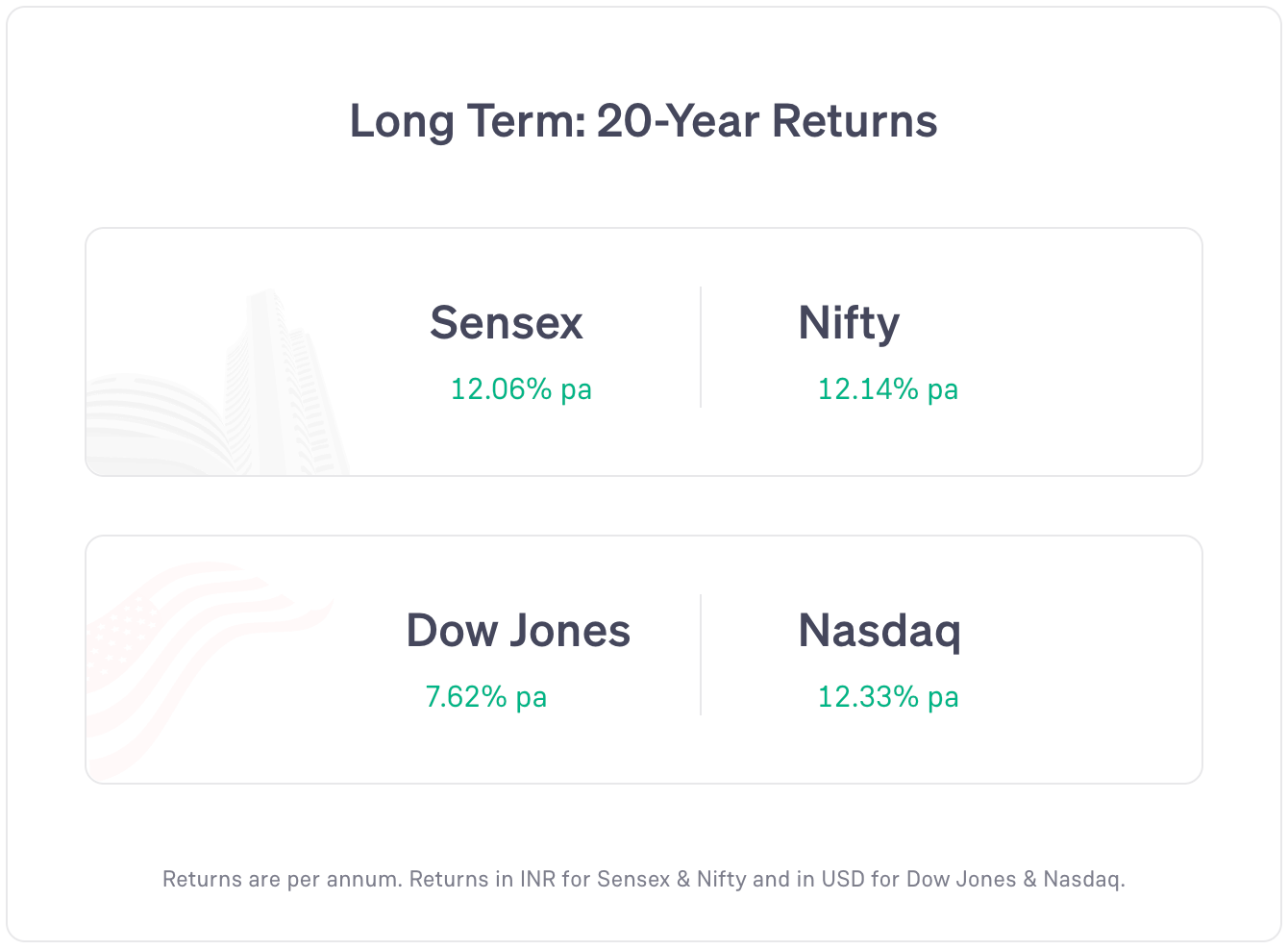PhysicsWallah's 33% listing gains, Navi Mumbai Airport opening in Dec, & more - Groww Digest
Tuesday, 18 November 2025
Markets opened below yesterday’s closing point.
Nifty 50 fell in the last hour and closed in the red.
All sectors’ stocks fell today. Realty stocks and IT stocks fell the most.
Global markets: US markets and Asian markets fell. European markets fell (as of 6 pm IST).
News
The central government approved 17 applicants for the Production Linked Incentive (PLI) scheme for textiles with an investment of Rs 2,374 crore.
Capillary Technologies IPO was subscribed 52.95 times. Retail subscription: 15.82 times. IPO is closed for subscription.
PhysicsWallah IPO listed on the stock exchanges at a premium of 33.03% over the issue price and closed 42.42% up at the end of the day.
Emmvee Photovoltaic IPO listed flat on the stock exchanges and closed 1.11% up at the end of the day.
Stocks Updates
Solar Industries: and its subsidiary received export orders worth Rs 1,400 crore to supply defence products over 4 years.
Adani Enterprises: will open operations for Navi Mumbai International Airport from 25 Dec with 23 daily flights, expanding to 34 from Feb 2026.
Tata Power: company subsidiary, Tata Power Renewable, commissioned a 300 MW solar project for NHPC in Bikaner, Rajasthan.Bajaj Auto: company subsidiary,
Bajaj Auto Credit, fully redeemed Rs 500 crore worth of commercial papers on maturity.
InterGlobe (IndiGo): was fined Rs 20 lakh by DGCA for implementing a flight procedure at Udaipur Airport without required approval from the Airport Authority of India.
Word of the Day
Trading Account
It is an account that is used to buy and sell shares and other securities in the market
Just like a demat account stores your investments, a trading account is used to place orders. It executes the buy and sell transactions.
When you buy, money is debited from the trading account and when you sell, money is credited back to the trading account.
The trading account acts as a bridge between the bank account and the demat account.
6 Day Course
Theme: different kinds of buyers/sellers in share market
Day 2: Tuesday
FPIs — Foreign Portfolio Investors.
These are investors based abroad but investing in the Indian stock markets.
This category includes all kinds of overseas-based institutional investors. It can include insurance companies, mutual funds, index funds, hedge funds, etc.
These investors are usually very stable in their investment style — they do not react as rapidly to good/bad news.
They usually invest larger amounts and are capable of causing large swings in share prices with their buying/selling.
International factors greatly affect their decisions. This includes geopolitical factors, exchange rates, and interest rates in the US and other big western economies.
For this reason, Indian investors like to keep an eye on the activities of FPIs. It may sometimes give some idea of what is happening in the markets.
Featured Question
Q. “Please explain Value investing vs growth investing. Hiw does one identify which stock is value /growth?”
There are many stock picking strategies. These two are the most talked about strategies.
Value investing:
The idea behind value investing is to pick up stocks for a price that is fair or lower.
Paying a high price for a stock is a no no.
Of course, the definition of ‘fair’ is different for different investors. It is subjective. There’s no clear formula for it.
Value investors tend to pay a lot of attention to the fundamentals like revenue, earnings, debt, cash flow, etc.
Growth investing:
The idea behind this is that it is okay to pay an overvalued price for a stock as long as it grows very fast.
If a stock price rises high enough, a slightly overvalued price is still going to lead to profits.
Growth investors tend to pay a lot more attention to revenue growth, future potential, ability to scale, total addressable market, ability of the management, etc.
They tend to be more comfortable with higher valuations/overvalued stocks.
Growth investing is considered riskier than value investing.
Value stocks vs growth stocks
- Growth stocks tend to have higher valuations (higher PE ratio, PB ratio, etc)
- Growth stocks’ earnings growth is higher
- Volatility and risk is also higher in case of growth stocks
- Growth stocks tend to require a longer investment horizon from investors
- Value stocks tend to give higher dividends
In short: value investors want to pay a fair price for shares. Growth investors are betting on future potential.
Something investors need to understand is that there is no clear definition for what a growth stock is and what a value stock is.
It is a bit loosely discussed.
Many investors do not like these two words at all because their definitions can be vague.
Did you like this edition?
Leave a feedback here!






Why in "Top losers" TATA Motors is mentioned, the company split into two TATA Motors Passenger and TATA Motors Comercial and has different price..???